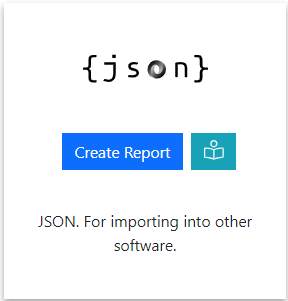JSON Report
What is a JSON Report?
A JSON report contains the Agenda for your event in a format that is designed to be read by a machine. It is a good format to use when sharing the data with a developer.
Note
The JSON report is useful for an occasional transfer of data. If you are going to regularly share data with another system you should consider using the JSON Publishing Endpoint instead.
How do I create a JSON report?
- Navigate to >
- Click ‘Create Report’ for the ‘JSON’ option


- You will see a screen to configure the report. You can choose which sessions and speakers to include (see below for details).
- Once you are happy with the configuration press ‘Save’
- To run the report click ‘Run’, the report will generated and will appear in a list titled ‘Generated Reports’. Click the ‘Download’ button to download the report
How do I filter the sessions and speakers in a JSON report?
You can filter which Speakers and Sessions will be included based on a number of criteria. Some common use cases for filters are:
- Preventing ‘Placeholder’ sessions from being included
- Holding back a Speaker who is not yet ready to be announced
- Excluding sessions scheduled during the ‘build up’ day for the event
- Only including speakers who have confirmed their slot
- Removing a particular location, or track from the included schedule
- Anything you can think of using labels!
For Speakers you can filter in 3 ways
- Choose which speakers are to be included based on their relationship to sessions
- (If Speaker Confirmation is enabled): Include speakers that have a confirmed session that is include and not filtered out.
- Include speakers that are speaking on any session that is included and not filtered out.
- Include all speakers
- Include no speakers
- Apply more granular filters with labels
- Only include speakers with a particular label. For example you might want to use a ‘Content Reviewed’ label to flag speakers that have had their content reviewed.
- Exclude speakers with a particular label. For example you might want to exclude a ‘Do not include’ label to prevent including of speakers who are not yet ready to be included.
For Sessions you can filter in numerous ways
- Choose which sessions are to be included based on their relationship to speakers
- Include All Scheduled Sessions. Includes sessions regardless of whether they have confirmed speakers or not.
- (If Speaker Confirmation is enabled): Include sessions that have one confirmed speaker.
- (If Speaker Confirmation is enabled): Include sessions that have all their speakers confirmed.
- Include All Sessions (available on Lineup Ninja Agenda App only)
- Apply filters with labels
- Only include sessions with a particular label. For example you might want to use a ‘Content Reviewed’ label to flag sessions that have had their content reviewed.
- Exclude session with a particular label. For example you might want to exclude a ‘Placeholder’ label to prevent including of sessions which are not yet populated.
- Filter by location
- Only include sessions in a particular location, or locations. This can be useful if you are including an agenda for just one or two locations.
- Exclude sessions in a particular location, or locations. This can be useful if you have scheduled sessions in your Green Room or similar back stage location.
- Filter by resource
- Only include sessions needing a particular resource. This could be useful if you are producing an agenda for a particular team that manages some resources.
- Exclude sessions needing a particular resource.
- Filter by Date
- Only include sessions in a date or dates. Useful if you are producing an agenda for a particular day.
- You can exclude a date or dates from your publication. Useful if you have dates for build up and tear down in your agenda.
- Filter by Track
- Only include sessions in a particular track or tracks. Useful if you are producing separate agenda for separate parts of your event
- Exclude sessions on a particular track. Can be useful to block presenting of a track until a product launch has happened.
Schema
The Schema matches the JSON Publishing Endpoint
Next - ZIP Report
Still can’t find what you’re looking for? Email support@lineupninja.com and one of the team will get back to you as soon as possible.